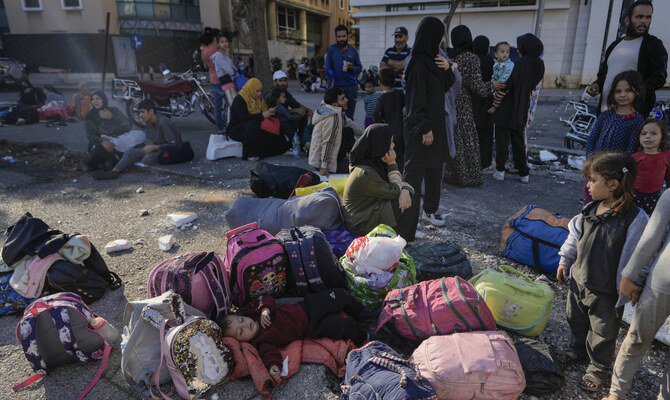BEIRUT: Smoke was still rising from Beirut’s southern suburbs Saturday morning, visible to many of the families who had fled their homes there the night before to escape Israel’s massive bombardment.
It had been a harrowing night — getting out amid earthshaking explosions, looking in vain for space in one of the overflowing schools-turned-shelters. By the morning, hundreds of families were sleeping in public squares, on beaches or in cars around Beirut.
Lines of people trudged up to the mountains above the Lebanese capital, holding infants and a few belongings.
Overnight, Israel unleashed a series of strikes on various parts of Dahiyeh, the predominantly Shiite collection of suburbs on Beirut’s southern edge where tens of thousands of residents live. The biggest blasts to hit Beirut in nearly a year of conflict killed the leader of Hezbollah, Hassan Nasrallah, Friday.
The assault was part of a rapid escalation of Israeli strikes the past week that has killed more than 700 people in Lebanon. Israel has vowed to cripple Hezbollah and put an end to 11 months of its fire onto Israeli territory in what Nasrallah described as a “support front” for his ally Hamas in Gaza.
The newly displaced swell the numbers Beirut is absorbing
The people escaping Friday night’s mayhem joined tens of thousands who have fled to Beirut and other areas of southern Lebanon the past week to escape Israel’s bombardment.
For many residents of Dahiyeh, the forced evacuation was disconcertingly familiar.
Some were Lebanese who had lived through the bruising monthlong war between Israel and Hezbollah in 2006, when Israel leveled large parts of the Beirut suburbs. Others were Syrians who had taken refuge from the long civil war in their own country.
Fatima Chahine, a Syrian refugee, slept on the Ramlet Al-Bayda public beach in Beirut with her family and hundreds of strangers. The night before she, her husband and their two children had piled onto a motorcycle and raced out of Dahiyeh, with “bombing below us and strikes above us.”
“Thank God, no one was wounded,” she said.
The government has opened up schools in Beirut to take in the displaced. But Syrians have reported that some sites turn them away to reserve the few spaces for Lebanese. Chahine said her family came directly to the beach.
“We only want a place where our children won’t be afraid,” she said. “We fled from the war in Syria in 2011 because of the children and we came here, and now the same thing is happening again.”
Since Monday, some 22,331 Syrians in Lebanon have crossed back into Syria, along with 22,117 Lebanese, according to Lebanese authorities.
Chahine said returning is not an option for her family; she is from an opposition area and so could face reprisals from the Syrian government.
At the beach, the displaced were spread out over the sidewalk or in cars parked by the curb. Others were camped out in beach pagodas or on blankets in the sand.
“We spent more than three hours going in circles between schools and shelters and we didn’t find one with room,” said Talal Ahmad Jassaf, a Lebanese man who slept on the beach with his family. He said he is considering going to the relative safety of Syria. But he worries about airstrikes on the road between Beirut and Damascus.
Some people are left without aid
The UN Office for Coordination of Humanitarian Affairs, or OCHA, said this week’s escalation had more than doubled the number of people displaced by the conflict in Lebanon. There are now over 211,000 people displaced, including some of the humanitarian workers who should be responding to the crisis, it said. Around 85,000 of them are sleeping in shelters, it said.
“Humanitarian capacities to respond have been severely overstretched,” it added.
Displaced people sleeping outside in Beirut largely told The Associated Press that they had not received assistance from any humanitarian organization.
A stadium in the seaside neighborhood of Manara owned by the Nejmeh soccer club opened its doors to the displaced, who spent the night sleeping on bleachers.
Among them was Mariam Darwish, her husband and five children. She fled her home in Dahiyeh earlier in the week when the first Israeli strikes hit there.
Darwish said they had received water from the soccer club but that no organization had brought food, blankets or other supplies.
“People are helping each other out, family and friends are getting things for each other,” she said.
She and her husband had fled during the 2006 war, when their oldest son was a baby, and returned to their home when the war ended. They hope their house will still be standing to return to this time, she said.
“We’re worried about our children and the schools, that they’ll lose out on their future,” she said. “What can we do? We can only say thank God.”
She added, “May the resistance be victorious.” At the time of the interview, Hezbollah had not yet confirmed Nasrallah’s death.
Despite their battered-down circumstances, others also struck a defiant tone.
Jamal Hussein fled Dahiyeh at 3 a.m. with his extended family amid ongoing bombing and spent the night sleeping on the seaside promenade in Beirut’s upscale Ain Mreisseh district.
“Of course we aren’t afraid for ourselves, but we have children,” he said. “We are steadfast and ready to sacrifice more than this.”
























